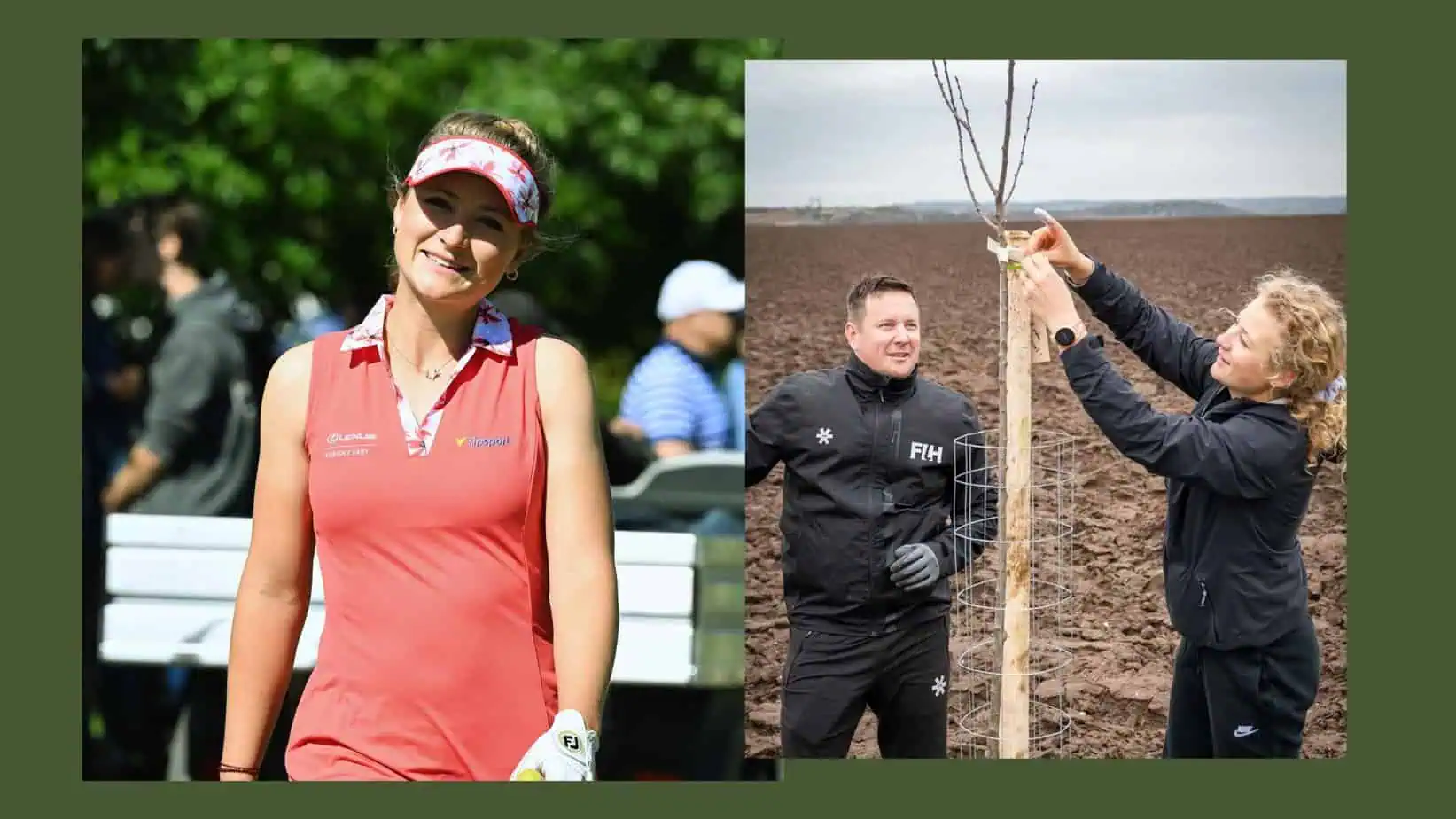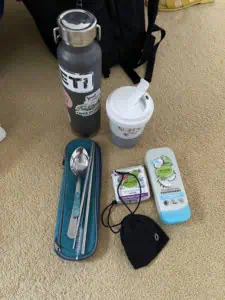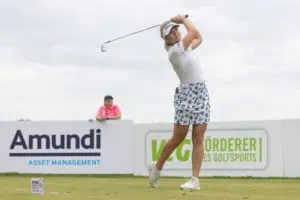Golf and the environment – the Czech Sará Kousková has been interested in both since she was a child. After studying at the University of Texas, she switched to the Ladies European Tour. She is at home in Prague, from where she travels from tournament to tournament with her boyfriend, who is also her caddie. We met Sará Kousková at the Amundi German Masters in Berlin. As a member of Amundi Team Europe, of which she is a member, she played there for the second time. She has been part of the EcoAthletes community since the end of 2023. The international association of athletes from all areas includes numerous world champions and Olympic champions. However, Sará Kouskova is the only representative from the world of professional golf.
Sará, why did you become a member of EcoAthletes?
Kouskova: I was approached by my colleague Inja Fric and my Czech friend Patrice about the EcoAthletes and thought it was a great group. It’s nice to keep up to date with the information and to be among like-minded people. I studied in America and life there was very consumer-oriented. That’s why I wanted to go back to Europe after my studies, to get back to my roots. And I think Europe is good at driving forward many sustainable initiatives.
Golf is one of the sports most affected by climate change. Do you feel the consequences during your work as a golf proette?
Kouskova: I haven’t been in the professional game for that long and I don’t yet have a full insight into how the courts and tournaments are changing. But of course you can see that there are many more storms. As far as golf courses are concerned, especially with the new EU regulations on pesticides and so on, I think a lot of golf courses will have to adapt their strategy to keep the golf course in shape. We played in Belgium and the Netherlands last year, and there are great examples of how to maintain golf courses in a good way. Sometimes you can already see the difference that climate change is making on the golf courses. The pitches are a bit drier, for example, but I think that’s one of the things we have to adjust to and accept as players.
On the Ladies European Tour, you also play tournaments outside Europe, where the understanding of sustainability can be different, in Saudi Arabia for example.
Kouskova: Yes, we would generally like it if the courses were more sustainable, but then we play in places like Riyadh in Saudi Arabia. It used to be a place in the desert, and now it’s a green place, and there’s so much water that’s dammed up there, and I don’t think it’s dammed up water from streams. We are coming up against many limits here: On the one hand, women’s golf is developing as a sport, but there are also difficulties along the way. We need financing. If we turn down sponsors like Aramco, where would we play? As a player, I don’t want to support an event that is sponsored by an oil company or fossil fuel producer, but on the other hand I have to earn a living.
Sustainability is not always an easy topic, as you have just said. Do the players at the LET talk about it?
Kouskova: For me, it’s a matter of course. This is an issue that affects all areas of our lives, not just nature. So I see it as a way of life, and I know some of the Scandinavian women who think similarly on this subject.
Are there efforts by the LET to become more sustainable?
Kouskova: Yes, yesterday, for example, I was very pleased: the LET now has a sustainability team that includes a representative from each department from the internal staff. Some players have pushed the issue a little. I think we also need to put some pressure on the tournament organizers. Everyone should learn from each other. The organizers could share resources from tournaments. The LET is also on its way to becoming almost completely paperless, which is really great. And of course there is the partnership with the GEO Foundation and John Deere. These are great companies that are committed to sustainability. The LET also communicates many social initiatives, such as the golf courses we run for children and girls who want to play golf. That’s all great. I think it just needs to progress faster and more intensively.
As a professional athlete, you have to travel a lot….
….ja to Australia, for example (she shakes her head)
How do you try resolve this conflict?
Kouskova: One of the reasons why I didn’t fly to the tournament in Korea this year was also that I didn’t want to take another flight that only goes there and back for one tournament. I did fly to Australia, but it was a return flight from the USA and there were several tournament stops. So it was a kind of round trip. When I’m at home, I’m of course out and about a lot on my bike. And I concentrate on other topics – waste separation, for example. That was a bit of a passion of mine from an early age. I try to think ahead so that I don’t end up producing any residual waste. And I use a lot of things made from recycled materials, whether it’s shopping bags or cosmetic pads, for example. When I travel, I take my water bottle, my coffee mug and my cutlery with me. Sometimes that’s not easy. In Saudi Arabia and Hong Kong, for example, airport security took away my knife and fork. Then you realize how you reach your limits, because everyone asks: Why are you travelling with your cutlery? I then tell them: I don’t need plastic cutlery. I simply try to reduce waste as much as possible.
Professionals always have to wear the latest golf fashion – how do you feel about that?
Kouskova: I would like to reduce that in future by only doing a few
take new parts. However, it’s basically my uniform and after one season it’s pretty worn out. After college, there was a time when I still had a lot of
clothes from the college golf team. I didn’t have a clothing sponsor for a while, so I continued to wear my college clothes.
How do you choose your sponsors?
Kouskova: I try to work with partners who think like me, such as Tipsport, who have a foundation and plant trees, which is a great thing. Or Amundi: Amundi has an ESG strategy and informs people about finance and the social structure of money. For me, this is also part of the sustainability issue.
At home in Prague, you train on the Oaks Prague pitch. How sustainable is the space?
Kouskova: A lot of attention is paid to water management on the course and a lot of water is collected. This is very important, and golf courses often do this better than agriculture.
Suppose you are CEO of the LET for a week and can start two sustainability projects? What will you choose?
Kouskova: One would be standardization for tournaments. There could be much more material
transported and reused at events. We also need
no plastic bottles at tournaments, only large water containers at each tournament
hole to fill up our own bottle. The catering should be provided mainly by local
suppliers. We should therefore draw up a checklist for each tournament to ensure that we minimize our use of resources. That would be the first project number. The second project would be to educate players about everything that goes on in the background of a golf course operation. We need to emphasize this more in the media and in public. I think both would be good.









